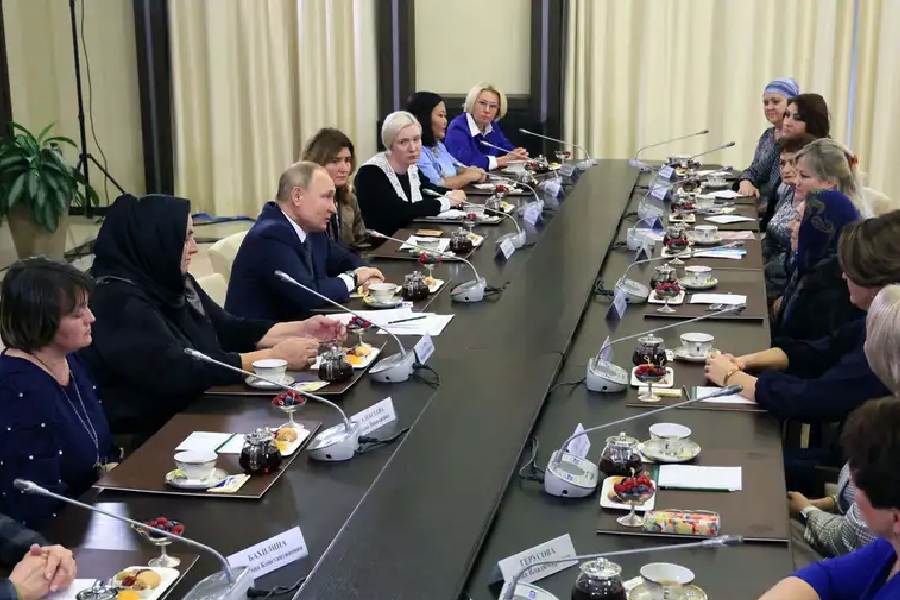Protests in which the wives of Russian soldiers deployed to Ukraine lay flowers at the Tomb of the Unknown Soldier in Moscow while calling for the return of their husbands have become a regular ocurrence. Similar scenes are also playing out in other cities across Russia. Thus, the families of Russian men sent to fight in Ukraine are garnering ever more attention. Meanwhile, Russian opposition groups have pledged support for soldiers' relatives as they believe recruiting has become an Achilles' heel for the Kremlin.
Still, when it comes to the war in Ukraine — it is almost two years since Russia's full-scale invasion — there are differences of opinion among politicians, and even among the families of deployed soldiers. Some condemn the war, while others back it but have called for rotations at the front.
"We are deleting all messages calling for demonstrations!," read a November 7 post on the "We Are Together" Telegram channel for the wives of Russian soldiers deployed to Ukraine. The post was designed to keep soldiers' relatives from attending anti-war protests.
Olga Kats, a well known activist whose brother was killed on the front last year, explained the move on her "Vernyom Rebyat" (Bring the Boys Home) Telegram channel, saying demonstrations are a complicated issue. "Of course, it's easiest to voice one's anger by going to Red Square and stomping one's feet," wrote Kats. But, she added, such activities could also attract provocateurs, eventually leading to a collapse of "dialogue with the authorities." Kats herself sees the war as one of confrontation with the West, which she says must be thwarted in its attempts to carve up Russia.
But as Kats warned against attending demonstrations last November, five women from the "Put Domoi" (The Way Home) movement gathered for their first vigil in Moscow. They called for their relatives to be brought home, above all, because deployments to the Ukrainian front are open-ended.
Images from the vigil quickly spread on social media but police made no arrests. Nevertheless, some participants received visits from the authorities who urged them to forgo such public activities in the future. But the opposite happened, with the women moving their vigil to the gates of the Kremlin, where they began placing flowers at the Tomb of the Unknown Soldier.
The first protests were more like debates between those for and against Russia's invasion of Ukraine. At first there were just eight participants, about two months later that number had grown to around 50. Meanwhile, similar vigils have begun taking place in other regions across Russia.
At one such event in Yekaterinburg on February 10, police arrested five participants laying flowers at a monument for the victims of the wars in Afghanistan and Chechnya. Those arrested were said to have violated rules against public gatherings. One man was sentenced to eight days in jail for "organizing a demonstration against the special military operation," which is the official name given to Moscow's war in Ukraine.
In Moscow, the number of women participating in vigils has grown. Olga (not her real name), whose husband is deployed on the front, recently joined in for the first time. Prior to that she had written to various authorities demanding her husband be returned home. Like other women, she was told that she should wait until Russian President Vladimir Putin announced an end to mobilization for the war.
Then, Russia's military representatives informed her that it was impossible to limit the duration that soldiers must serve when called to the front because it would necessitate "fundamental changes to military training." Olga was so infuriated upon hearing this that she decided to head out into the streets.
Meanwhile, the women are attempting to win over Russia's politicians. In the run-up to this March's presidential election they received support from the opposition candidates Yekaterina Duntsova and Boris Nadezhdin. When the two were disqualified by Russia's central election commissiono, Maria Andreeva, one of the leaders of the Put Domoi movement, turned to another presidential candidate, Vladislav Davankov.
Andreeva made the same request for help to Vladimir Putin's team. Putin is running for his fifth term in office. She said that she received replies from neither Davankov nor Putin.
During two years of war, Putin has rarely spoken of the mobilized soldiers. At one rare meeting with the relatives of fallen soldiers in November 2022, he cynically quipped: "All of us have to leave this world behind at some point." Russian media outlets have also spent the past two years telling citizens that there are no problems related to the mass mobilization of soldiers.
But Russian opposition figures — such as liberal politician and YouTuber Maxim Katz, who fled to Tel Aviv in 2022 after being labeled a "foreign agent" by the Kremlin; London-based Michail Khodorkovsky; and the team surrounding Alexei Navalny, who just died in a Russian prison — have all highlighted problems with it.
Maxim Katz says Russia's authorities cannot make concessions to the protesting wives because then other relatives would start calling for men to remain at home. But he said that with every passing day it was becoming clearer to Russians that it was a matter of "life and death."
"The authorities don't see any comfortable solutions, that's why they are acting so vaguely with regard to the protests."
He said those concerned should join Put Domoi's 70,000 followers and subscribe to its Telegram channel.
The stance of some of the relatives from the Put Domoi movement diverges dramatically from views held by Navalny's supporters. One of the movement's leaders, Paulina Safronova, told DW she supported Russia's "special military operation." At the same time, she can be seen in a YouTube video criticizing the fact that there are no limits to the length of frontline deployments. When Safronova cancelled a scheduled interview with DW at the last minute, she justified the move by saying it was better to avoid speaking with foreign media outlets given today's dangerous times.











